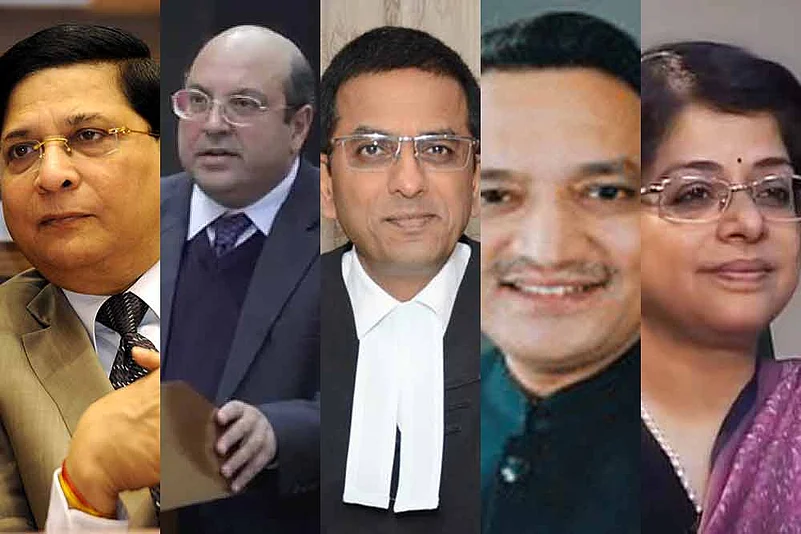Gay sex among consenting adults is not an offence, the Supreme Court said on Thursday as it read down Section 377 of the Indian Penal Code.
Sustenance of identity is the pyramid of life, observed Chief Justice of India Dipak Misra.
"No one can escape from their individualism. Society is now better for individualism. In the present case, our deliberations will be on various spectrums," CJI Misra said.
Besides the CJI, the bench also comprised Justices R F Nariman, A M Khanwilkar, D Y Chandrachud and Indu Malhotra.
Justice Dipak Misra
Justice Dipak Misra is the current and 45th Chief Justice of India. CJI Misra is retiring on October 2. But as the day is a national holiday on account of Mahatma Gandhi's birth anniversary, October 1 will be his last working day.
Born in 1953, Misra began his career as an advocate in February 1977. He was appointed Additional Judge of Orissa High Court on January 17, 1996.
He was later transferred to the Madhya Pradesh High Court on March 3, 1997. He became a permanent judge on December 19, 1997.
Justice Misra was appointed as Chief Justice of Patna High Court on December 23, 2009. He was transferred as Chief Justice of Delhi High Court on May 24, 2010 and was elevated as a Supreme Court judge on October 10, 2011.
He is known for heading the bench that dismissed Mumbai serial blasts convict Yakub Memon’s petition seeking a stay on his execution, and upholding the death sentence given to Nirbhaya’s killers.
Before he retires, Justice Misra is set to deliver verdict in several important cases such as Aadhaar, Ayodhya title suit, prohibition to the entry of menstruating women in Sabrimala temple, the "discriminatory" adultery law and the reservation in promotion for SC/ST.
Justice R F Nariman
Justice Rohinton Fali Nariman, son of the distinguished jurist Fali S Nariman, is a judge of the Supreme Court of India. Before being elevated as a judge, he practised as a senior counsel at the Supreme Court.
He was appointed the Solicitor General of India in July, 2011.
When he was elevated as a judge of the Supreme Court in July 2014, he became only the fifth to be elevated directly from the bar.
He pronounced the landmark verdict declaring Section 66A of the Information Technology (IT) Act as unconstitutional.
He was also part of the bench which directed controversial businessman Vijay Mallya to make a detailed disclosure of his assets abroad.
He will hold office until August 2021.
Justice A M Khanwilkar
Justice A M Khanwilkar is a Justice of the Supreme Court of India and the former Chief Justice of Madhya Pradesh High Court.
He was appointed an additional judge at Bombay High Court in 2000. Justice Khanwilkar was appointed as Chief Justice of the Himachal Pradesh High Court in April, 2013. He assumed charge as a judge of the Supreme Court of India in 2016.
He was part of the three-judge bench of the Supreme Court, which allowed a writ petition filed by the mother of a 13-year-old rape victim, seeking medical termination of the daughter’s 24-week-old foetus.
He was also a part of the Supreme Court Bench that ordered that medical colleges in tamil Nadu will have to use NEET as the only basis for admission.
Justice D.Y. Chandrachud
Justice D.Y. Chandrachud was appointed as a judge of the Supreme Court on 13 May 2016, He was the Chief Justice of the Allahabad High Court from 31 October 2013 until his appointment to the top court.
He had also served as a Judge of the Bombay High Court and as Director of Maharashtra Judicial Academy.
He was the Additional Solicitor General of India from 1998 until appointment as a judge.
Justice Chandrachud was part of the landmark judgement of nine-judge constitution bench of the Supreme Court that declared Right to Privacy as Fundamental Right.
Justice Indu Malhotra
Justice Indu Malhotra is the second sitting woman judge of the Supreme Court and the first woman lawyer to be directly elevated from the Bar.
She is the seventh woman judge of India’s top court since independence. The union government cleared her name as the SC judge in April this year after the Collegium comprising Chief Justice Dipak Misra, Justices J Chelameswar, Ranjan Gogoi, Madan B Lokur and Kurian Joseph unanimously recommended her.
As a senior lawyer, she was a member of the Vishaka Committee and was also on the panel set up to protect women lawyers from sexual harassment in 2013.
















